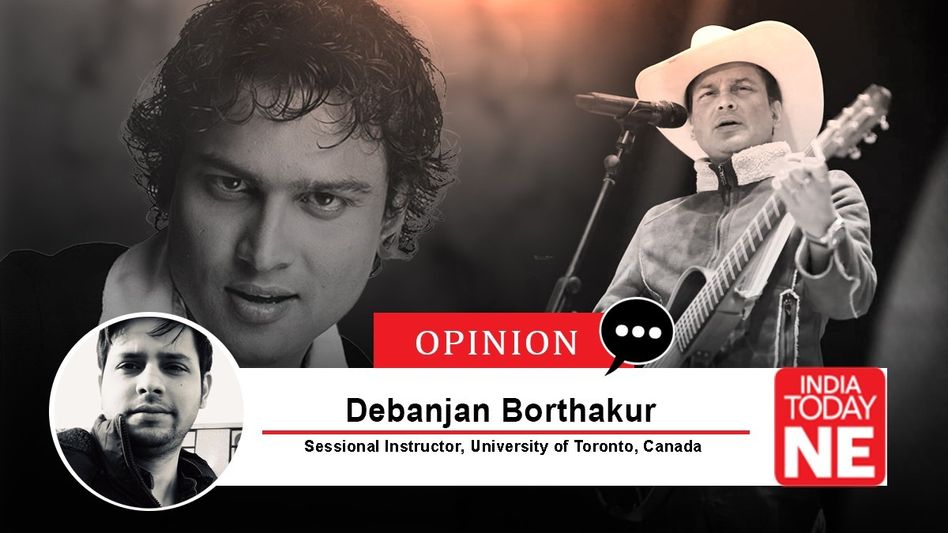Zubeen: The Rebel Genius
Zubeen has carved a niche in Indian music by blending traditional and modern sounds. His versatile songs continue to inspire and captivate audiences nationwide

The shooting star that briefly lit our sky has disappeared, perhaps roaming other worlds to light them now. A flood of sorrow rose in Assamese hearts. Even his own songs can’t easily quiet this grief; in his absence, the soft moonlight seems dimmed, a storm of unshed tears moves through our smiles. But to name Zubeen merely “whimsical” is to miss the truth. He was a non-conformist genius, a bohemian for whom rebellion was not an act but a temperament. Zubeen never compromised. He said plainly that no one can dictate him. Yet often what passes as politeness and gentlemanliness is only a mask for hypocrisy.
He once noted that Steve Jobs dropped out; perhaps this rebellious streak was in Zubeen’s DNA. He never compromised on personal autonomy or freedom of expression, never feared that society or its laws could crush his voice. Geniuses are not born to bow; they create the new rather than maintain the status quo. He did not compromise in public life either, and he even took to the streets against the government. His songs named power directly: ministers and MLAs as Papadam —only sound and no substance; he turned the stage into a place where hypocrisy was unmasked.
When John Lennon warned that the Beatles were “bigger than Jesus,” America erupted; records were burned. He wasn’t courting scandal; he refused to let polite decorum shrink his art. Bob Dylan, at the start of his career, wrote “Masters of War,” a direct assault on war and political power that many of his era dared not sing. In September 1967, Jim Morrison and The Doors were told to alter “Girl, we couldn’t get much higher” for The Ed Sullivan Show. Morrison sang the original line clearly, deliberately, without apology, and the band was banned for life. The point was larger than a single word: the artist’s words belong to the artist, not the network.
Zubeen stands in this line. If you are an Assamese, you will remember the Nunmati Bihu Sanmilani. His stance was simple: I will sing what my heart chooses; you can’t dictate to me. His absence has again moved Assam deeply. Genius minds are, by nature, wayward, unruly, controversial, and sometimes drawn toward alcohol. Society should understand this, because it gives more than most can imagine. If he wished to sleep under the sea (xagor tolit xubole mon), perhaps we need not have stopped him; perhaps that day we should have scolded him a little, not to clip his freedom, but to care for the man behind the legend. Lennon and Morrison didn’t live long; Assamese listeners wished to keep Zubeen forever. Maybe such rebel geniuses are not quite of this world; they arrive like shooting stars and vanish again. Zubeen was never a static star; he was a streak of fire, a pōpīyā torā, still roaming space, lighting other constellations with melody.
Schopenhauer drew the line crisply: talent hits a target others can hit; genius hits a target others cannot even see. Zubeen refused to walk the road others walked; he cut a new path from the Anamika album onward. Most geniuses are outliers, non-conformists: Galileo in science, Karl Marx against the capitalist order, Beethoven against the rules of classical composition. Many modern originals also stepped off the safe academic path: Bill Gates and Mark Zuckerberg left Harvard, Steve Jobs left Reed College, Bob Dylan left the University of Minnesota, Lady Gaga left NYU, Oprah Winfrey left Tennessee State, Jack Dorsey dropped out twice from two different colleges. Zubeen left B. Barooah College and walked into the fields of music, sowing melodies.
High-intelligence minds can imitate; genius creates. We must preserve Zubeen’s creations, yet a nation may wait many years to see another composer-singer like him. Imitation and followership are not the character of genius; rebellion and non-conformity are its ornaments.
If we let the imagination wander for a moment: Hemingway writing The Old Man and the Sea under the narcotic hush of night; Albert Camus with a cigarette, muttering that reality can be meaningless; Kipling with The Jungle Book amid opiate haze; Van Gogh painting Starry Night under the influence. And Zubeen, perhaps, tracing chords on a keyboard, humming lines of longing and distance, rest and restlessness. When he wore two different-colored shoes, we criticised; now we see it as personal freedom of expression. He seemed truly free as Kanchenjunga, as tall as eucalyptus. In his absence, Assamese hearts seem eager to see, once more, those mismatched shoes.
Maybe Zubeen had a touch of narcissism; most geniuses do. Their inner world is different. Virginia Woolf admitted she lived poised between reality and madness. Our rule-loving society, so attached to compliance, sometimes scolded him. From him, maybe some of us listeners never wanted jokes or spectacle; we wanted the inner fire within him. And now we want him back, restless or deep, in any form. His non-conformity made his work singular and unmatched. He did not imitate; after Zubeen, others will only imitate Zubeen. His absence opens a void in Assamese music which is unbearable.
Assamese are in grief; perhaps the universe is indifferent to his absence and to our sorrow. As Camus would have it, we chase meaning amid meaninglessness, and even so, evening stars will go on speaking his name. As long as Assamese identity endures, so will he. As a rebellion against tradition, Ai Weiwei once broke a Han-dynasty urn to argue that newness may require letting go of the old. Zubeen did something similar: against blind rule, hypocritical rulers, and the naked struggle of greed, he broke the chains and built his own world, where in the fields of song he sowed melody unique, one-of-a-kind.
The “27 Club” is a cultural symbol—Jimi Hendrix, Janis Joplin, Jim Morrison, Kurt Cobain, Amy Winehouse, and more artists who left at 27. Zubeen outlived that number, but the metaphor remains: a star we needed to care for. Keeping this star alight was our collective responsibility; failing to keep him alive is a failure of us. In music, acting, social service, he stood with the Assamese people. Society gave love, even worship, yet maybe he did not get the care he deserved. In return, Assam will carry a flame of sorrow for a lifetime.
I didn’t meet him in Assam; we met him in Canada. At the St. Volodymyr Cultural Centre, perhaps close to midnight, the audience was a hush of eagerness. Ten o’clock struck; he entered, took up the guitar, and began- “Mayabini ratir bukut.” A blanket of silence fell, the kind that only magic can spin.
Zubeen is gone. His music is immortal. His non-conformity, his refusal to follow, was the very source of his creation. Behind the visible restlessness lay the depth of life. Because of him, hundreds of nights’ darkness receded; life turned bright with colour. Even now, we see autumn moonlight, and across that moon we see a shooting star again as if Zubeen himself were roaming the cosmos, with that easy smile.
Zubeen showed that artistic sovereignty is not arrogance; it is the fragile chamber where songs are born. He taught us that genius is a path you cut, not a road you inherit; that rebellion, when tethered to love for one’s people, is care. Maybe Zubeen is still roaming around other universes like a shooting star, lighting other stars as it goes.
Copyright©2026 Living Media India Limited. For reprint rights: Syndications Today









